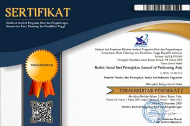The Effect of Music towards the Reducing of Stress Levels in Young People
Abstract
Keywords
Full Text:
PDFReferences
Azwar, Saifuddin. (2015). Penyusunan Skala Psikologi. Yogyakarta: Pustaka Pelajar.
Clift, Stephen; Grenville Hancox; Rosalia Staricoff and Christine Whitemore. (2008). Singing and Health: Summary of a Systematic Mapping and Review of Non-Clinical Research. Sidney: De Haan Research Centre for Arts and Health.
Davidson, Jane W. & Renita A. Almeida. (2014). An Exploratory Study of The Impact of Group Singing Activities on Lucidity, Energy, Focus, Mood, and Relaxation for Persons With Dementia and Their Caregivers. UK: Springer.
Gick, Mary L. (2010). Singing, Health, and Well-Being: A Health Psychologist’s Review. UK: Carleton University.
Irwanto. (1998). Focus Group Discussion (FGD): Sebuah Pengantar Praktis. Jakarta: Pusat Kajian Pembangunan Masyarakat, Universitas Atma Jaya.
Harrington, Rick. (2013). Stress, Health, and Well-Being: Thriving in the 21st Century. America: MPS Limited, a Macmillan Company.
Neuman, W. Lawrence. (2011). Social Methods: Qualitative and Quantitatif Approaches. Boston: Pearson Education, Inc.
Kanner, Allen D.; Coyne; Schaefer; Lazarus. (1981). Hassles Scales. UK: Pinguin Book
Lazarus, R.S. (1991). Emotion and Adaptation. New York: Oxford University Press.
Lazarus, R.S. (1993). From Psychological Stress to The Emotions: A History of Changing Outlooks. Sydney: Emory University.
Matsumoto, Junko; Shiori Aoki; Manami Watanabe. Positive Psychological and Interpersonal Effects by Karaoke. Japan: TNU Press
Merton, Robert K. (2008). The Focussed Interview and Focus Groups: Continuities and Discontinuities. UK: Oxford University Press.
Miller, David B.; Aloen Townsend. (2005). Urban Hassles as Chronic Stressors and Adolescent Mental Health: The Urban Hassles Index. UK: Oxford University Press.
Selye, Hans. (1986). A Personal Message from Hans Selye. Journal of Extension, 23(3)
Yousef, Gomaa Sayed. (2005). Stress Management. Egyp: Faculty of Arts-Cairo University.
DOI: https://doi.org/10.24821/resital.v19i1.2455
Article Metrics
Abstract view : 0 timesPDF - 0 times
Refbacks
- There are currently no refbacks.
This work is licensed under a Creative Commons Attribution 4.0 International License.



